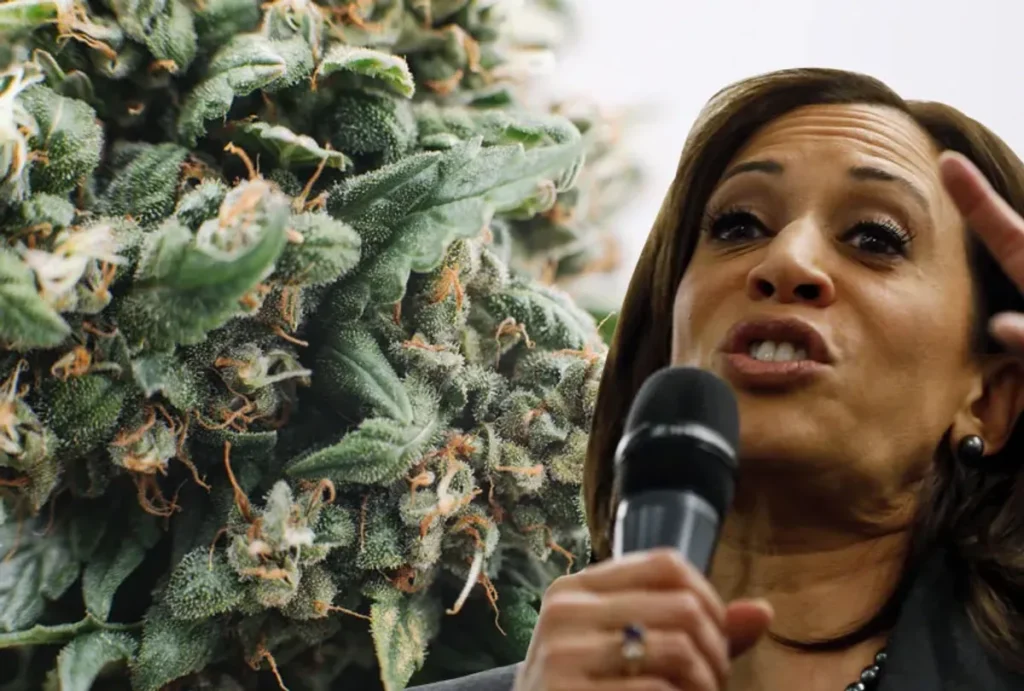Subscribe to Updates
Get the latest creative news from FooBar about art, design and business.
As Kamala Harris campaigns for the 2024 presidential election, her push for marijuana legalization is positioned as a key part of her platform. Framing this move as an effort to promote racial justice and create opportunities for Black Americans, Harris’ advocacy is raising questions about the sincerity of her intentions. Is this truly about reforming an unjust system, or just another political strategy to win votes?
Her shift from a tough-on-crime prosecutor to a champion of marijuana reform raises eyebrows, especially when considering her past record on drug-related prosecutions.
Harris’ Changing Stance on Marijuana
Harris’ stance on marijuana has evolved dramatically over the years. Early in her career as the District Attorney (DA) of San Francisco and later as California’s Attorney General (AG), she took a hardline approach to drug offenses, including marijuana-related crimes. She opposed California’s Proposition 19 in 2010, a measure that would have legalized marijuana. However, as public opinion shifted, so did her stance. By the time she became a U.S. Senator, Harris began championing marijuana reform as a social justice issue, co-sponsoring the Marijuana Justice Act in 2018 and publicly supporting legalization during her presidential campaign in 2020.
Harris past shows a contradiction between her actions as a prosecutor and her current advocacy for legalization. This dramatic change in position has led many to question whether her current support for marijuana reform is genuinely about social justice or simply a convenient political strategy to appeal to certain voter demographics. In any case, how can we trust her?
A clear objective: to target black Americans with the legalization of marijuana
One of Harris’ most controversial claims regarding marijuana legalization is her emphasis on using it as a tool to “create opportunities for Black Americans.” While presenting cannabis reform as a form of racial justice, Harris is keen to highlight how Black Americans have been disproportionately affected by marijuana laws. She argues that legalization will not only end unjust prosecutions but also provide economic benefits to Black communities by opening up business opportunities in the cannabis industry.

Critics argue that this focus on Black Americans is part of a larger political strategy to secure votes from a key demographic, rather than a sincere effort to uplift communities. Her emphasis on cannabis reform as a solution to systemic racial inequality has drawn skepticism, with many questioning whether this approach simplifies the deeper issues facing Black communities, such as education, employment, and criminal justice reform. Therefore, this is nonetheless very clumsy, as it clearly implies that she sees Black Americans as the only marijuana users.
Her Record on Prosecution of Marijuana Offenses
As DA of San Francisco, Harris oversaw numerous marijuana convictions, with more than 1,900 people convicted for marijuana-related offenses during her tenure. While she has since distanced herself from those tough-on-crime policies, her past record raises questions about her commitment to the cause of social justice. During her time as AG, data showed that Black Americans were disproportionately affected by marijuana laws, even as Harris continued to prosecute such cases.
Harris once oversaw the incarceration of many Black Americans for marijuana offenses, now she presents herself as a reformer. This contradiction between her past actions and present advocacy has led to widespread criticism, with some accusing Harris of using marijuana reform as a way to whitewash her tough prosecutorial history.
So… Is It Really About Social Justice?
Kamala Harris’ emphasis on marijuana legalization as a form of racial justice seems convenient rather than genuine. While she portrays herself as a reformer, her prosecutorial history contradicts this narrative. Her broader criminal justice reforms, though marketed as progressive, fail to fully align with her newfound advocacy for marijuana. Harris’ record raises doubts about the sincerity of her social justice agenda. Her push for cannabis reform might just be a political strategy, not a true solution for the racial inequities she claims to address.
Even if Harris’ marijuana policies are enacted, they are unlikely to address the deeper systemic issues facing Black Americans. Legalization alone does not equate to meaningful economic opportunities or structural change. Harris is positioning marijuana reform as a key solution to racial disparities. The real issues: education, criminal justice reform, economic inequality, require more than cannabis legislation.
A Call to Question the Political Motives
It’s time to critically examine Kamala Harris’ true motives behind her marijuana push. Is this a genuine attempt to address systemic issues or just another political gesture to secure votes? Voters need to demand real, meaningful solutions for Black America beyond surface-level reforms like marijuana legalization. It’s time to question the true intentions behind Kamala Harris’ cannabis agenda. Her past record and current positioning suggest that this may be more about political gain than genuine change.
Marila Cegelski is a patriot with a keen eye for detail and an unwavering commitment to exposing falsehoods and setting the record straight. Maria's articles cut through the noise and deliver the unfiltered truth. As the voice of the people, Maria isn't afraid to tackle controversial subjects.
- Marilahttps://therwth.com/author/rod/
- Marilahttps://therwth.com/author/rod/
- Marilahttps://therwth.com/author/rod/
- Marilahttps://therwth.com/author/rod/

